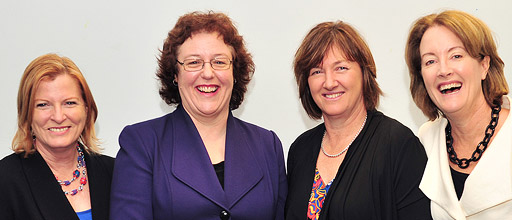
Boost for research and clinical care into Fetal Alcohol Spectrum Disorders
University of Sydney researcher, Professor Elizabeth Elliott, has had critical input into the federal government’s $20 million grant announced today to fund research and prevention of Fetal Alcohol Spectrum Disorders (FASD).
Together with Professor Elliott and Associate Professor Jane Latimer from the University and The George Institute for Global Health, the Minister for Mental Health and Ageing, Jacinta Collins announced the additional funding at a launch at the Children’s Hospital at Westmead.

FASD is a broad term to describe a range of growth, behavioural and central nervous system abnormalities caused by exposure of the developing fetus to alcohol during pregnancy.
Professor Elliott has undertaken extensive research in the area and her data played an important role informing the work of a House of Representatives Committee Inquiry into FASD.
The result of the committee work has seen the release of a new Commonwealth Action Plan which will focus on FASD research and prevention, tackle alcohol abuse and keep woman and children safer.
Speaking at the launch of the plan, Professor Elliott said for paediatricians, FASDs are amongst the most frustrating and distressing of all conditions they have to deal with.
“Frustrating, because they are potentially preventable - if only women could avoid alcohol during pregnancy. Distressing, because alcohol consumed during pregnancy is toxic to the rapidly growing brain and other organs,” she said.
“Alcohol is a problem throughout Australian society but, unlike us, the fetus has no say in the debate.
“We know from our research that many Australian women drink alcohol during pregnancy and many turn to alcohol to deal with the stresses in their lives, not knowing it may harm their unborn child.
“But we also know that early diagnosis can prevent the secondary problems seen in adults – problems with mental health, crime, substance abuse and unemployment – and that appropriate care enables adults with FASD to contribute usefully to society.
“Rates of FASD are particularly high in some remote Aboriginal and Torres Strait Islander communities where alcohol has decimated the community over decades, and has had added implications for a people who have an oral culture.
“The Minister’s announcement is most welcome. Prevention is the future and we desperately need the proposed public education, prevention programs and evidence-based treatment for women who are alcohol dependent.
“We urgently need tools, training and facilities to enable health professionals to diagnose and manage FASD and we particularly need to assist Aboriginal communities.”
Announcing the plan, Minister for Mental Health and Ageing Jacinta Collins said the goal was to prevent and manage the impact of FASD on Australian children and families.
“FASD is an entirely preventable condition, and we need to take strong action on this critical issue for many Australian families,” Minister Collins said.
“Our action plan will continue efforts to improve the diagnosis of FASD which will help support those affected.”
The Action Plan has five key priority areas:
- Enhancing efforts to prevent FASD in the community
- Secondary prevention targeting women with alcohol dependency
- Better diagnosis and management of FASD
- Targeted measures to prevent and manage FASD within Indigenous communities and families in areas of social disadvantage
- National coordination, research and workforce support

